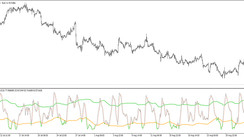Oil Prices Rise Amid Blinken's Middle East Visit
As U.S. Secretary of State Antony Blinken prepares for his Middle East trip intending to subdue the escalating regional tensions due to the ongoing Israel-Hamas conflict, oil prices surged higher by over $1 on Friday. Brent crude futures saw a rise of $1.34, a 1.7% upswing, reaching $78.93 per barrel. Meanwhile, U.S. West Texas Intermediate crude futures climbed by $1.62, indicating a 2.2% increase to $72.81 by 1407 GMT.
Market Recuperates Last Week's Losses
The first week of January is on its way to end on a high note for both benchmarks, bouncing back nearly fully from the losses experienced the previous Thursday, catalysed by significant increases in U.S. gasoline and distillate stocks. Tamas Varga, a PVM analyst, characterized the price rebound as a testament to the risk factor that runs deep with the ever-increasing tension in the Middle East.
Conflict Provokes Vessel Diversion and Diplomacy
In light of the stress, Maersk has made an announcement to reroute all vessels from the Red Sea indefinitely, alerting customers of potential disruptions. Israeli defense leaders have suggested a more focused strategy in the north of Gaza, coupled with the pursuit of Hamas leaders in the south.
Considering the growing risk of the conflict broadening, Blinken is scheduled for a week-long diplomatic visit to the Middle East. The State Department has stated that the risk of escalation at the Israel-Lebanon border remains unfortunately high, as shared by a German foreign ministry spokesperson.
Investors Keep an Eye on Macroeconomic Indicators
Investors are closely observing macroeconomic data in order to forecast when interest rate reductions will start, since lesser borrowing rates potentially act as economic growth catalysts, subsequently increasing oil demand.
Euro Zone Inflation and Fed's Monetary Policy
Euro zone inflation increased in December, expected to continue its upward trajectory till early 2024, giving room for the European Central Bank to consider cutting rates. However, the recent U.S. Federal Reserve meet signaled managed inflation, drawing focus to the possible risks that may stem from an "overly restrictive" monetary policy for the economy. Friday's official data showed U.S employers hired more workers and raised wages in December than anticipated, possibly altering expectations over Fed's quick interest rates cut.





